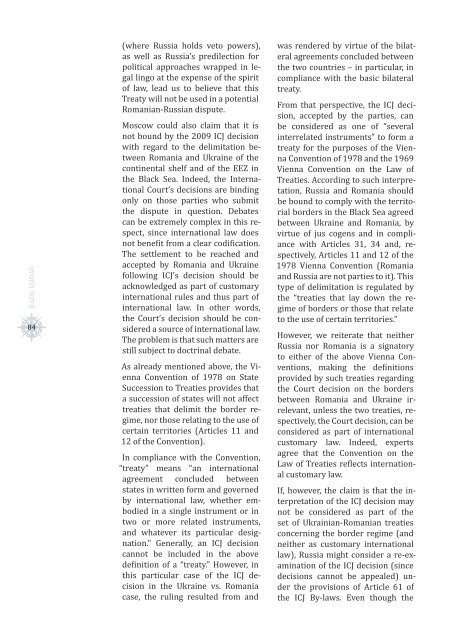You also want an ePaper? Increase the reach of your titles
YUMPU automatically turns print PDFs into web optimized ePapers that Google loves.
RADU DUDAU<br />
84<br />
(where Russia holds veto powers),<br />
as well as Russia’s predilection for<br />
political approaches wrapped in legal<br />
lingo at the expense of the spirit<br />
of law, lead us to believe that this<br />
Treaty will not be used in a potential<br />
Romanian-Russian dispute.<br />
Moscow could also claim that it is<br />
not bound by the 2009 ICJ decision<br />
with regard to the delimitation between<br />
Romania and Ukraine of the<br />
continental shelf and of the EEZ in<br />
the Black Sea. Indeed, the International<br />
Court’s decisions are binding<br />
only on those parties who submit<br />
the dispute in question. Debates<br />
can be extremely complex in this respect,<br />
since international law does<br />
not benefit from a clear codification.<br />
The settlement to be reached and<br />
accepted by Romania and Ukraine<br />
following ICJ’s decision should be<br />
acknowledged as part of customary<br />
international rules and thus part of<br />
international law. In other words,<br />
the Court’s decision should be considered<br />
a source of international law.<br />
The problem is that such matters are<br />
still subject to doctrinal debate.<br />
As already mentioned above, the Vienna<br />
Convention of 1978 on State<br />
Succession to Treaties provides that<br />
a succession of states will not affect<br />
treaties that delimit the border regime,<br />
nor those relating to the use of<br />
certain territories (Articles 11 and<br />
12 of the Convention).<br />
In compliance with the Convention,<br />
“treaty” means “an international<br />
agreement concluded between<br />
states in written form and governed<br />
by international law, whether embodied<br />
in a single instrument or in<br />
two or more related instruments,<br />
and whatever its particular designation.”<br />
Generally, an ICJ decision<br />
cannot be included in the above<br />
definition of a “treaty.” However, in<br />
this particular case of the ICJ decision<br />
in the Ukraine vs. Romania<br />
case, the ruling resulted from and<br />
was rendered by virtue of the bilateral<br />
agreements concluded between<br />
the two countries – in particular, in<br />
compliance with the basic bilateral<br />
treaty.<br />
From that perspective, the ICJ decision,<br />
accepted by the parties, can<br />
be considered as one of “several<br />
interrelated instruments” to form a<br />
treaty for the purposes of the Vienna<br />
Convention of 1978 and the 1969<br />
Vienna Convention on the Law of<br />
Treaties. According to such interpretation,<br />
Russia and Romania should<br />
be bound to comply with the territorial<br />
borders in the Black Sea agreed<br />
between Ukraine and Romania, by<br />
virtue of jus cogens and in compliance<br />
with Articles 31, 34 and, respectively,<br />
Articles 11 and 12 of the<br />
1978 Vienna Convention (Romania<br />
and Russia are not parties to it). This<br />
type of delimitation is regulated by<br />
the “treaties that lay down the regime<br />
of borders or those that relate<br />
to the use of certain territories.”<br />
However, we reiterate that neither<br />
Russia nor Romania is a signatory<br />
to either of the above Vienna Conventions,<br />
making the definitions<br />
provided by such treaties regarding<br />
the Court decision on the borders<br />
between Romania and Ukraine irrelevant,<br />
unless the two treaties, respectively,<br />
the Court decision, can be<br />
considered as part of international<br />
customary law. Indeed, experts<br />
agree that the Convention on the<br />
Law of Treaties reflects international<br />
customary law.<br />
If, however, the claim is that the interpretation<br />
of the ICJ decision may<br />
not be considered as part of the<br />
set of Ukrainian-Romanian treaties<br />
concerning the border regime (and<br />
neither as customary international<br />
law), Russia might consider a re-examination<br />
of the ICJ decision (since<br />
decisions cannot be appealed) under<br />
the provisions of Article 61 of<br />
the ICJ By-laws. Even though the










